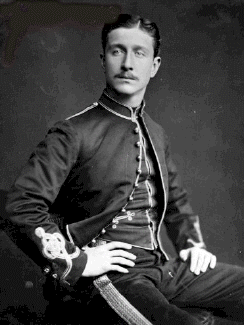[size=+1]
Lajos III, King of Hungary[/size]
Birth & Early Life
His Majesty Király Lajos III Bourbon, King of Hungary, was born Louis-Philippe Henri Joseph de Bourbon, Comte de Chartres, on 6th July, 1842, at the estate of his father, Henri-Gaston de Bourbon, Duc d'Orléans. The eldest son of one of the most powerful noblemen in France, and favoured nephew of the Emperor, Louis-Philippe was introduced to royal politics at an early age, and benefitted immediately from the privileges and opportunities provided by aristocratic status and royal favour. By his early teens, Louis-Philippe was a favourite guest at his Uncle's court; he was engaging and amicable, with an endearing sense of humour and a quiet dignity uncommon amongst the noblemen at court -- but furthermore he was immediately recognized as a boy of keen intelligence and great potential for leadership. At the age of thirteen he left the house of his father at Orléans to reside full-time at the Imperial court, where he began his education under the Empire's finest tutors: the very same teachers, in fact, who would later bring up the young Dauphin Julien, Louis-Philippe's cousin. Under the guidance of the finest minds in France and Spain, the young Comte de Chartres learned history, geography, philosophy, rhetoric, mathematics, physical science, Latin, German, and royal etiquette. By all measures Louis-Philippe excelled, especially in the fields of language and history; by his sixteenth birthday, the Comte could recite perfect Virgil, recall all the details of the Nine-Year's War, and hold his own in a debate about the nature of God and Man with Europe's sharpest intellects. His primary education being thus completed, Louis-Philippe left the court of his Uncle for a spot at the École Spéciale Militaire de Saint-Cyr, France's premier military academy.
Military Career
At Saint-Cyr Louis-Philippe's natural aptitude for the military arts emerged; graduating at the top of his class, the Comte displayed an intuitive understanding of artillery and combined-arms tactics, and the utilization of terrain and artillery deployment to gain an advantage over the enemy.
After graduating Saint-Cyr, Louis-Philippe received his commission as a Capitaine, commanding a cavalry squadron in Algeria. The cavalry quickly proved unsuited to the Comte's talents, however, and he was transferred to command an Imperial infantry company in Mexico. During his tenure in Mexico, Louis-Philippe proved a capable commander and effective leader. During this same time he also developed strong sympathies for the Liberal cause of the Mexican revolutionaries he had been sent to suppress; while he would not tolerate open rebellion against the Empire, on an intellectual level he supported the Mexican philosophy of constitutional monarchy and representative government. This political doctrine remained with him when he returned to France the following the year, to accept promotion to the rank of Lieutenant-Colonel and command of the Garde Imperial in his native Orléans.
While in France, Louis corresponded with the Continent's most brilliant thinkers and political theorists. He communicated often with Liberal political philosophers and leaders in Italy, Poland, and Hungary; some of his own ideas helped to shape the policies of the Liberal factions in these countries.
King of Hungary
In late 1864, Louis-Philippe was approached by an agent of the nascent Hungarian government, who had been authorized by the Parliament and Regent to offer him the Holy Crown of St. Stephen, on the condition that he accepted constitutional limits on his power. Louis-Philippe jumped at the offer, which he saw as an opportunity to put his Liberal principles of constitutional monarchy into practice. In Hungary he also saw a young state in need of guidance, and one with great potential which could, in the right hands, be transformed into a strong and prosperous state. After only a few days' deliberation, Louis-Philippe accepted, and ordered that plans be made for his journey to the Magyar capital at Budapest.
Louis resigned his commission as a Lieutenant-Colonel, and signed a contract waiving his claim to the succession of the Duchy of Orléans. Nonetheless, before leaving, he was presented by his Uncle with the honorary rank of Général de Division, and the honorary title of Chevalier de Saint-Michel.
On 1st December, 1865, Louis-Philippe Henri Joseph de Bourbon accepted the Holy Crown from the Archbishop of Budapest in St. Stephen's Basilica, thereby becoming the first King of modern Hungary. This ceremony was followed shortly thereafter by two others: a royal wedding, and the ratification of the National Constitution. Less than a month after being crowned in Budapest, Lajos III, as he was now called, married Countess Zsofia Andrássy of Krasznahorka, cousin of Gyula Andrássy, the prominent Parliamentarian of Kossuth's National Liberal party, and the daughter of a wealthy and well-standing Magyar nobleman.
Soon thereafter Lajos signed his name to the document created by Deák, Szalay, and Pulszky, officially establishing a constitutional and limited monarchy in Hungary. Lajos immediately called upon Kossuth, who had stepped down as Regent following the coronation, to form a responsible government; Parliamentary monarchy had begun in the realm of St. Stephen.




 Thx to das for the idea (mentioned in the update)
Thx to das for the idea (mentioned in the update)